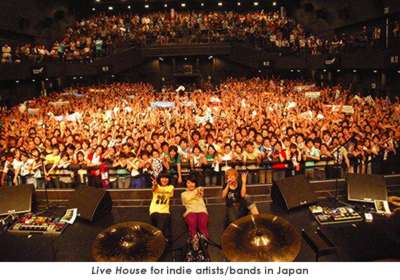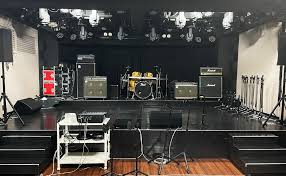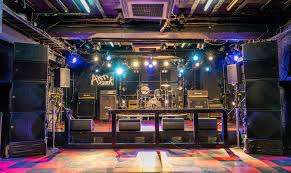< Previous Article Next Article >
Article 3: Playing Gigs in Japan
Promoting Your Music at Japanese "Live Houses" and Other Venues
If you are searching for "booking agents" in Japan you will not find any. In the West, you often hire a booking agent to book gigs at bars, clubs and other venues. They do not charge you up front but take a share from your pay.
In Japan, bars, clubs and other venues do not hire (book) bands unless you are a very famous DJ or jazz artist or rock band. If you are indie, don't expect to get paid. Venues do not pay indie bands to play. Instead you have to sell a set quota of tickets. If not, you must pay the difference. In effect, it is like you are renting the venue.
So since there is no pay to take a share from, booking agents do not exist in Japan like they do in the USA and other countries.
There are big concert organizers/promoters in Japan, but they only work with more famous international artists and their record labels that they know they can make a profit from. They get paid to organize/promote the concerts and get a share of revenues. If you are not known in Japan or on a respected label in Japan, they will not be interested.
There are a few companies that specialize in organizing ("booking") tours/shows in Japan for foreign indie bands/artists/labels (click for contact info or login to your Top Music Japan account) . You will be responsible for paying for travel, accommodation and all other related expenses. The tour booking/management company also charges fees for their services. Don't expect to get paid either. For new and indie bands/artists, going to Japan for a live tour is a marketing/promotional expense rather than a source of revenue. If you are not in it for the money but for the "travel and experience" that is great too! Contact the companies that specialize in booking/managing custom tours for indie artists and bands that want to experience sightseeing as well as playing shows in Japan's major cities like Tokyo, Osaka, Kyoto, Kobe, Nagoya...
See which foreign bands/artists from your country are performing live in Japan
If bars and clubs don't book bands, then where and how do bands get gigs in Japan?
The venues where most indie artists/bands play is called a rai-bu house (live house). These are privately owned and operated venues set up especially for live musical performances. They may also offer food and bar service. Some are designed like upscale clubs with world-class sound systems, lighting, and stages with seating capacities over 1,000 people while others are a little more sparse in terms of interior design and equipment (i.e. a neighborhood pub). Most fall in-between.
There are hundreds in Tokyo alone and all across Japan in most major cities and even smaller towns. Venue capacities typically can range from 30 to a couple hundred people. All drum kits, amps, PA, lighting, and engineers are included or can be rented.
Some live houses will hold auditions and then "book" bands for certain nights. 3-5 bands may be booked for the night and each band may get a 15-45 minute set. There is no pay. The bands have to sell a set number of tickets (e.g. 20 tickets at $20 to $40 each). If they don't sell their quota then they must pay the difference (or they pay up front). For foreign bands, this doesn't apply. Since foreign bands cannot fly to Japan just for a 5-minute audition, it is important to set up a website in Japanese complete with music samples, videos and press kit in order to impress venue owners and managers.
Click here for info, websites and photos of 5,800 Live Houses, Concert Halls, Clubs, Cafes/Bars, Rental Spaces, and other Music Venues in Japan
It is also a good idea to contact Japanese artists/bands or their record labels in your genre who may be able to put you on their show schedule. They won't pay for any of your expenses but you won't have to setup the gigs yourself.
If you can speak Japanese, have a good budget, and are keen at event production then you can book a live house (i.e. rent the space) yourself. In Tokyo, rental fees for a decent live house can range from $1,000 to $5,000 for a Friday, weekend, or holiday night. You get the venue from about 3PM to 11PM (soundcheck at 4PM). Shows typically last from 2 to 3 hours maximum and start anywhere between 6 to 9PM. The live house opens its doors 1 hour before start time. There may be charges if you go overtime. Tickets and merchandise can be sold to recoup costs.
Live house operators usually have no problem renting their venue to a foreign band/event producer/record label as long as they get paid the rental fees. They don't care about your other expenses like airfare, accommodation, etc.
It is best to check with your nearest Japanese embassy or consulate about the visa you require to enter and perform in Japan. If the Japanese immigration officer finds that you have a criminal record then you will not be permitted to enter Japan.
If you are lucky enough to be invited to play in Japan by an event organizer, then that is great. There are several music festivals held during the year in Japan.
Click here for a list of music festivals and conferences in Japan that invite foreign artists.
If you have sent your music and press kit (i.e. Japanese website link) to the right people in Japan, you may be surprised with an invitation to play. Creating a Japanese website is a good start at getting some attention in Japan. Click here to get a free Japanese website.
A live house has everything so the band only needs to show up with a guitar, bass and pair of drumsticks. This helps "indie" artists to travel light since many will use the train system to get to gigs. Guitars, basses, synths, pianos, etc. can sometimes be rented at the live house so it is possible to not bring any gear to Japan for your tour.
The Metro Tokyo area has a population of 38 million (greater than the population of many countries) so you may want to only play in this area depending on your budget. However, since Japan is about the size of Germany or California State and the transportation system vast, fast and reliable, it is possible to play gigs in many major urban areas throughout Japan. Osaka and Nagoya are the 2nd and 3rd largest cities respectively. The bullet train can take you to northern cities like Sendai and Niigata or southern cities like Fukuoka and Hiroshima in several hours. With a Japan rail pass, you can cover most of the country in a short period of time relatively inexpensively (assuming you don't have tons of gear and a huge entourage) and establish a good fan base in one tour. Some tours have the band playing 7 shows in 7 different cities—all in 8 days! If you're coming from America then you will start feeling sleepy late in the afternoon or early in the evening Japan time and wake up very early morning Japan time so you may want to give yourself a couple of days to get used to the time change if your budget allows (or else drink a lot of can coffee or energy drinks from the vending machines).
A live tour should be coordinated with other advertising and promotion to be most effective. In addition to posting your tour schedule in your Japanese website, there are several music websites in Japan where you can promote your live house tour. Most live houses will use their website, social media, as well as flyers and posters to promote their shows but most do not put much effort into further promotion. In most cases, if people know it is a foreign band, they will be more interested in checking you out. Needless to say, you should also have your music readily available for Japanese to purchase either from a traditional retail shop in Japan or a website that caters to Japanese customers and that accepts YEN in the popular payment methods in Japan. You can sell your CD's, streams and downloads directly from your Japanese website so all you have to do is let the audience know your website URL (use QR Codes).
A good idea is to get a bunch of bands/artists together so you can all share the expenses (and experiences) of a live tour in Japan. Some record labels bring over 3 to 5 bands/artists for one tour (i.e. a showcase tour).
We recommend using one of the companies that specialize in organizing tours/gigs in Japan for foreign indie bands/artists (click for contact info or login to your Top Music Japan account) .
Remember, the main goal of doing live shows in Japan (your first tour anyway) is music promotion—developing a fan base and generating publicity—not making an income. It is a marketing/promotional cost that you or your record label pays in order to increase awareness and sales of your music in Japan. Nevertheless, a tour of Japan is a fun and unforgettable experience for foreign indie bands/artists.
The best form of promotion is performing live shows in Japan.
Live shows/tours are the best way to establish a loyal fan base in Japan and to promote your music. It also helps in getting publicity in other media and motivates your distributor to push your product at stores.
Use one of the companies that specializes in planning and managing live shows/tours for foreign indie bands/artists and record labels. The costs of touring in Japan will vary depending on the number of members and amount of tour support services required. In addition to everyone's transportation, accommodation, food, and other personal costs, the tour planning/management company must also be paid for its services. Don't expect to make any income or a profit.
If you are wondering how much doing a Japan tour costs, go to your local travel agency and ask them how much a standard tourist package would be for Japan (staying 7 days and visiting Tokyo and maybe Osaka) for the number of people in your band—then add some extra to come up with a conservative budget for your tour! If you can afford that budget and have at least 4-6 months leadtime (and valid passports with no criminal records) then contact the companies that specialize in the planning and management of live tours and shows in Japan for foreign indie bands/artists and labels.
Click here to see some of the bands/artists from your country that are playing gigs in Japan.
The next best form of promotion is YouTube Music Video Ads.
Not all artists/bands have the time or budget to go to Japan to play live. The next best thing is a video! Ideally, you should create a music (or lyric) video for all of your releases. You can use software or online tools such as ROTOR, ANIMOTO, Filmora, Animaker, and Videobolt to easily and affordably create music or lyric videos which you can upload to your YouTube channel and embed in your Japanese website.
Using your YouTube music videos in a YouTube (Google) Video Ad Campaign is one of the the most cost-effective ways to get your music heard in Japan without actually having to be in Japan. It is cheaper and faster to get Japanese people to watch your YouTube music videos than it is for your whole band to travel all the way to Japan and perform live. Depending on your ad budget, from 10,000 to over 100,000 Japanese people will watch your video (listen to your music).






